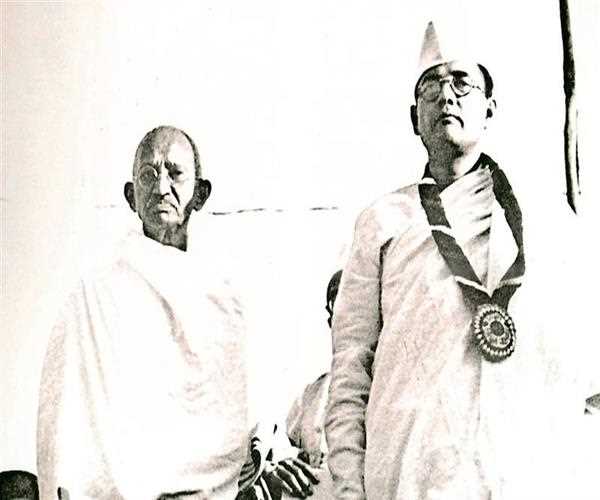
13-Jul-2022 , Updated on 7/13/2022 5:35:26 AM
IDEOLOGICAL DIFFERENCES BETWEEN GANDHI AND BOSE
IDEOLOGICAL DIFFERENCES BETWEEN GANDHI AND BOSE
Both Mohandas Karamchand Gandhi and Subhas Chandra Bose are significant freedom fighters. Both of them significantly contributed to India's struggle for freedom. Although they fought for the same cause, their ideologies and methods of approach differ greatly. In this article, we shall focus on the ideological differences between Gandhi and Bose.
Method of approach:
Gandhi strongly believed in ahimsa(non-violence) and satyagraha(truth-force). According to him, violence could only result in the loss of lives and increased hatred and tension between the masses. Many people accused Gandhi of using ahimsa because he was weak and afraid to take up arms. In his reply, he stated 'My non-violence does not admit to running away from danger and leaving dear ones unprotected. Between violence and cowardly flight, I can only prefer violence to cowardice. I can no more preach non-violence to a coward than I can tempt a blind man to enjoy healthy scenes.'
Bose, on the other hand, believed that ahimsa and satyagraha would not be sufficient to free India from British rule. According to him the only way to gain independence was through a militant approach. He believed that the British should always be addressed with diplomacy and tact. He also considered seeking help from foreign countries.
Means and ends:
Gandhiji believed that goals could not be reached no matter how hard one tries. Bose, on the contrary, was determined to fulfill his targets.
Form of government:
Gandhiji was against centralization. He was in support of Ram Rajya, which had no representative form of government, constitution, army, or police.
Bose believed in democracy. Later, he suggested that the democratic form of government would not be appropriate to be imposed in India. According to him, a democratic government would not be able to reconstruct the Indian nation and eradicate the social evils of poverty and inequality.
Ideas on the economy:
Gandhiji was against centralization and state control. He believed in swaraj. He wanted India to become a Nation where people followed agriculture and live a sustained and independent life. Gandhi ji's ideology of swaraj or freedom can be classified into four categories-
1. national independence or freedom from British rule.
2. the political freedom of the individuals'
3. economic freedom of the individuals, and
4. spiritual freedom of the individuals.
For Gandhiji, swaraj meant self-government or self-rule.
Bose, however, was in favor of rapid industrialization. He thought that ' the problems of poverty and unemployment, of national defense and the economic regeneration in general, could not be solved without industrialization”. This economic planning was adopted in India post-independence. However, the credit for the planning was given to Nehru and not the mastermind, Bose.
Also Read: Rangeela Rasool Controversy and Gandhi's Role
Education:
Gandhiji was in favor of a local schooling system where students were to be taught in their local regional languages rather than western languages. He strongly opposed the use of English as a medium of instruction.
Bose was in favor of industrialization. Hence, he emphasized better education, especially in science and technology. Apart from basic academics, Bose also wanted to introduce military, technical and administrative education.
Participants and supporters:
Gandhiji commanded support from the local citizens of the nation, disregarding their profession or social class. Hence his approach was universal. He wanted all the ordinary people of India to stand by him and follow his ideologies of
ahimsa and satyagraha and stay away from any kind of violence or misconduct.
Bose wanted the peasants and the Indian people working for the British authority to support him. He believed that these people are being exploited by the British power and gaining their support to fight against the British would be beneficial.
Timing of struggle
Gandhiji abstained from conflict with the British during World War 2. He felt the need for Britain's support so that the latter could defeat the axial forces led by Germany, Italy, and Japan.
On the other hand, Bose wanted to strike down the enemy while it is vulnerable. Therefore, he joined hands with Japan to attack the British colonies in Asia. He wanted to befriend the axis powers since they were also against his enemy- the British. He formed the Azad Hind fauz (Indian National Army) with the help of the Japanese. Bose motivated his troops with his speech ' give me blood and I shall give you freedom.'
Conclusion:
While Gandhi and Bose differed greatly from each other in terms of their ideologies, they both respected each other. After all, both of them were fighting for the same cause- the struggle to free India from British colonial rule. While bose focused on the military approach and gathering arms against the British, Gandhiji focused more on self-rule and nonviolence. Bose referred to Gandhiji as the father of the nation while Gandhiji labeled Bose as the prince of patriots.
Despite their ideological differences and difference in their approach toward achieving freedom, both of their contributions to India is immensely significant. Both of them should be respected equally by us.
Also Read: The tiger of Indian freedom movement: Netaji Subhas Chandra Bose

Student
I am currently pursuing BTech in Information Technology from a renowned government engineering college in India. My hobbies include writing, reading, and clicking photographs.
Join Our Newsletter
Subscribe to our newsletter to receive emails about new views posts, releases and updates.
Copyright 2010 - 2026 MindStick Software Pvt. Ltd. All Rights Reserved Privacy Policy | Terms & Conditions | Cookie Policy